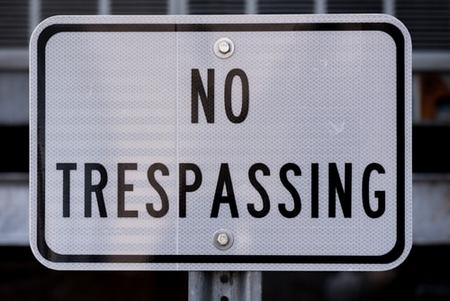What Are the Penalties for Criminal Trespassing in Illinois?
 When someone sees a “no trespassing” sign, he or she may not take it very seriously. It may seem more like a request to stay off of someone’s yard than an actual law. In legal terms, trespassing is defined as physically being on another person’s property without permission. Property owners have the right to call the police and have trespassers arrested and charged if they are on their premises. Generally, trespassing is charged as a misdemeanor offense in Illinois. However, if a person trespasses on a certain type of property or with the intent to commit a crime such as burglary, it could be charged as a felony.
When someone sees a “no trespassing” sign, he or she may not take it very seriously. It may seem more like a request to stay off of someone’s yard than an actual law. In legal terms, trespassing is defined as physically being on another person’s property without permission. Property owners have the right to call the police and have trespassers arrested and charged if they are on their premises. Generally, trespassing is charged as a misdemeanor offense in Illinois. However, if a person trespasses on a certain type of property or with the intent to commit a crime such as burglary, it could be charged as a felony.
Different Forms of Trespassing
It is important to note that under Illinois law, there are two types of trespassing, civil and criminal. Civil trespass typically involves a tenant-landlord situation in which a tenant fails to pay rent but still remains in the residence. The police will not get involved until the eviction process is formally started. Criminal trespass to property, residence, or vehicle are more serious offenses, which can lead to fines and imprisonment depending on the circumstances. A few examples of this type of trespassing include the following:
- Entering a building you do not have permission to be in
- Stepping foot on property when there are “no trespassing” signs clearly posted
- Using false documents to receive permission from the owner to enter or remain in a building
- Refusing to leave someone’s home after being asked to leave
- Operating or entering a vehicle, boat, plane, or snowmobile without permission to do so.
Illinois Punishments for Trespassers
According to Illinois Criminal code, criminal trespassing can be prosecuted either as a Class A or B misdemeanor, or even a Class 3 or 4 felony. The penalties for these offenses are as follows:
- Real property: This is a Class B misdemeanor, which carries 30 days to six months incarceration and a fine up to $1,500. It is considered a Class A misdemeanor it is on land used for growing crops or if a motor vehicle enters a marked area such as an orchard.
- Residence: The majority of the time this is a Class A misdemeanor, which can result in up to one year in jail and a $2,500 fine. However, if someone knowingly enters or stays in a residence knowing that people are present, it is a Class 4 felony.
- Vehicle: Criminal trespass to vehicles is a Class A misdemeanor, punishable by up to one year in jail and a fine up to $2,500.
In addition, trespassing on state-owned lands and nuclear facilities as well as public places such as sports arenas is charged as a Class 4 felony, which can result in one to three years in prison and a fine up to $25,000. If a person is in restricted areas of airport landing facilities, he or she can be charged with a Class 3 felony, punishable by two to five years in jail and a possible fine of $25,000.
Contact a Joliet Criminal Defense Attorney
Some people may think trespassing is a minor offense, but it should not be taken lightly. In certain situations, it can be charged as a felony offense, resulting in significant penalties. At McNamara Phelan McSteen, LLC, we are well-versed in Illinois criminal law and the consequences for violating them. If you or someone you know is charged with criminal trespassing, it is imperative that you seek legal guidance. Our skilled Will County trespassing defense lawyers will examine the details of your case to make sure your rights are protected. To schedule your free confidential consultation, call our office today at 815-727-0100.
Sources:
http://www.ilga.gov/legislation/ilcs/fulltext.asp?DocName=072000050K19-4
http://www.ilga.gov/legislation/ilcs/fulltext.asp?DocName=072000050K21-3
 815-727-0100
815-727-0100













